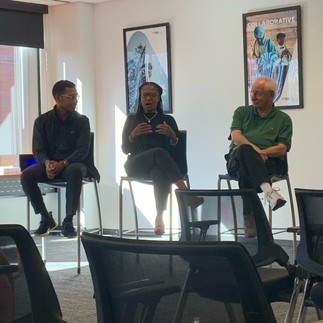A Conversation on Sustainability and the Digital Divide
- Laura Mercure
- Sep 18, 2023
- 3 min read
Updated: Sep 26, 2023
A recording for this event can be found here.
On September 14, Dean Hendricks, the Founder of the Hendricks Foundation, moderated a discussion on Sustainability and the Digital Divide in Cambridge, Massachusetts.
The event was sponsored by the Greater Boston Chamber of Commerce and featured a Question-and-Answer format of thought-provoking questions about the impact of sustainability impact on the digital divide.
The three panelists at the event included Courtney Leonard, CEO HerVision Media, Director Of Partnerships at Tech Boston Academy 6-12, a Boston Public School. Elliott Laffer is the Chairperson of the Neighborhood Association of the Back Bay and Counselor at SCORE Boston. Tyrone Ramath is the Site Director at Per Scholas.
Mr. Hendricks opened with his personal experience with the digital divide, and how he was lucky enough to get an outdated computer and use that to discover a passion for technology. He described the journey of the millions of tons of e-waste produced annually. “A lot of the computers are usable. A lot of the tech is not even outdated it’s just old. Two years old in a lot of cases. But we throw it out, it goes to a landfill, it does whatever it does to our climate and it does nothing to benefit. It would only seem like a simple solution to be able to take some of that e-waste, whatever can be used, repurpose it and use it as something that can build a bridge that can help others cross the digital divide.”
The discussion began by looking at the issue of the Digital Divide in Boston and some local solutions. Boston now offers students Chromebooks along with free (or reduced cost) internet service, but the Digital Divide does still exist in the city. Boston has among the highest percentage of universities of any city in the world but as many as 54,000 Boston K12 students lack computers in their homes. That figure is actually low compared to other American cities, like Houston, which is estimated at 142,650 students lacking home computers. In developing nations, the figure is even starker.
All three of the panelists spoke about the evolution of technology. Mr. Laffer remembered the world pre-internet, reminiscing that, “I remember the first AOL and it was magic to see the line fill across the screen. Now we all assume that we’ll have everything instantly.” Ms. Leonard spoke about how, “the digital space has grown three times as fast in the past 5 years than it did in the previous 15.” She added that there are a lot of greater things that you’re able to do when you have access to the newest technologies, but that the constant push for updates makes technology obsolete very quickly. Mr. Ramnath shared a story from his childhood about walking 45 minutes to the public library to use their computers to learn typing. He joked that, “I am astounded now to see little five-year-olds clicking and clacking keyboards.”
According to Haiti Net Literacy (a nonprofit organization whose mission is getting access to computers for all Haitians) the number could be as high as 89% of Haitian students who do not have a computer at home. Similar numbers were reported in the Dominican Republic (per the Organization for Economic Cooperation and Development).
While many developing nations lack the resources to purchase computers, the tendency many Americans have is upgrading their functioning devices to the latest models. According to United Electronic Recycling, every year Americans throw out approximately 100 million cell phones and over 41 million computers when they break or get outdated. That cycle is detrimental because so many of the components in these devices are toxic. Many people also choose to throw away their used electronics rather than recycling them, worrying about their security, and not realizing that nonprofit organizations like the Hendricks Foundation exist and will erase existing data in order for others to reuse the devices cleanly.
The final question of the evening was to challenge the panelists and members of the audience to think about how they can make a difference with this problem. One suggestion was to be thoughtful about purchases to ensure you have a plan for your old device before buying a new one. Now, I pose that question to you. How will you make a difference with this problem?

















Comments